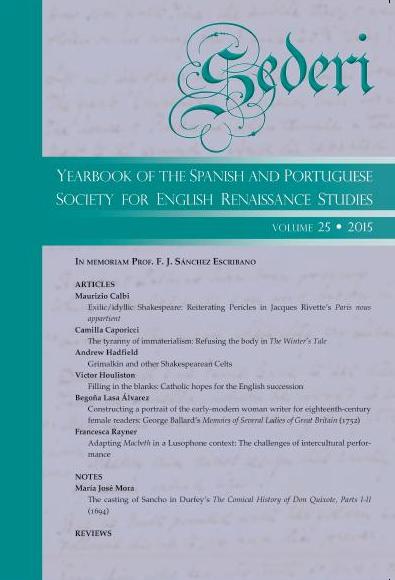The Tyranny of Immaterialism: Refusing the Body in The Winter's Tale
Resumen
The aim of this study is to analyse the way Shakespeare’s work reveals the failure – in both private and public lives – of a system of thought in which the body is construed as a mere receptacle of immaterial and “superior” entities, supposedly governed by rational kinds of political and social power. After a brief consideration of Measure for Measure as a play focused on the political danger of denying the material aspect of the individual, The Winter’s Tale will be seen as presenting a similar problem. Here, the aspiration to an ideal of absolute purity and the consequent demonization of the sexualized flesh, deriving from both Puritan theology and neo-Platonic philosophy, merges with the anxiety towards the “rebellious” body fostered by sixteenth century medical science, constituting the disruptive force that initiates the plot. This attitude of denial of the body, linked to political power, leads to both a psychological breakdown and, in the public sphere, to a regime of tyranny.Descargas
Descargas
Número
Sección
Licencia
The copyright holder of the published contributions is SEDERI.The hardcopy and an open-access version of the journal will be published simultaneously. The issues will be available online in the SEDERI website (http://www.sederi.org/yearbook/) and other repositories that have signed an agreement with SEDERI.
The authors who publish with this journal agree to the following terms:
a) SEDERI retains copyright of the essay.
b) If the author wishes to republish or rewrite the essay for another journal, or include the essay published in SEDERI in their personal repositories, or in any other way, they should contact the editors to obtain permission to do so. This will entail citing SEDERI as the original source and sending the editors a copy of the new version, or the link to the website, in case of online publishing.
The author(s) hereby warrant(s) that:
a) The essay submitted for publication is an original creation and does not infringe any copyright or property right of another journal, author or publisher.
b) The essay submitted for publication has not been previously published, whole or in part, and is not being considered for publication elsewhere.
c) Written permission has been obtained for any material from other sources included in the essay submitted for publication.




